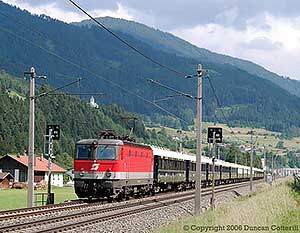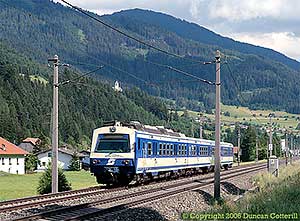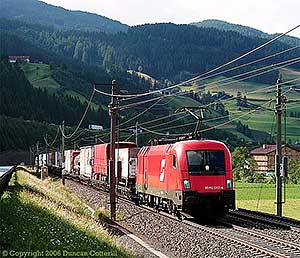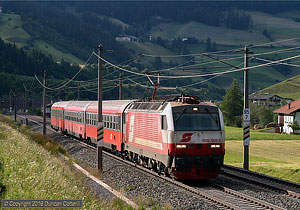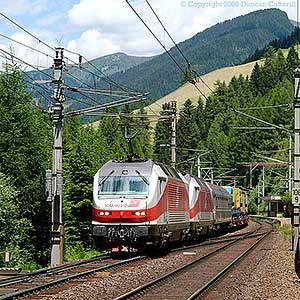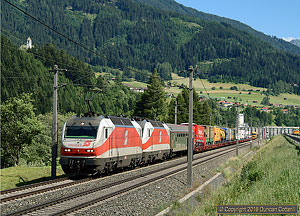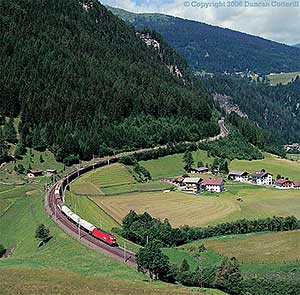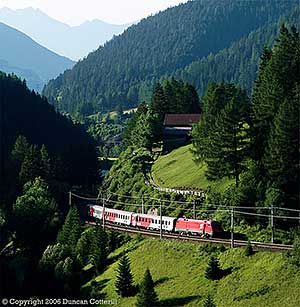The electrified double-track main line from Innsbruck over the Brenner Pass is one of Europe's more spectacular main line railways. It's an extremely busy route with local and express passenger trains interspersed with a large volume of international freight traffic, mainly running between Germany and Italy.
When construction started in the 1850s Verona and Venice were part of the Austro-Hungarian Empire and a rail link over the Alps was considered a strategic necessity to maintain control over a restless region. This proved only too true when Austria lost much of its Italian territory, including both cities, during the Third Italian War of Independence in 1866, a year before the line was completed. At least completion helped secure the empire's remaining lands south of the Alps for another 50 years, until the end of the First World War.
The Brenner is a difficult line to operate with gradients as steep as 1 in 38 and plenty of sharp curves, necessitating double heading and/or banking for heavier trains. Brennero is only 36km by rail from Innsbruck but almost 800m higher.
The northern side of the pass was electrified in the 1930s at the Austrian standard of 15kV, 16.67Hz AC and originally made an end on connection with the Italian 3-phase system at Brenner/Brennero, the border station since 1919, located at the summit of the pass. The Italian side was converted to 3kV DC in 1965.
The line has seen an eclectic mixture of electric traction over the years, with the principal Austrian classes being well represented. German locos have regularly run over ÖBB metals to Brennero for many years but, until recently, loco changes at the Italian border were the rule. The advent of multi-system locos and changes to EU rules to make through running much less bureaucratic have resulted in Italian locos running through to Germany, while German and Austrian locos regularly run into Italy.
As well as passenger and freight traffic to Italy, the line has been used for "Korridor" trains linking Innsbruck with Lienz, also in Austria, via Fortezza, in Italy.
The line over the pass has operated close to capacity for many years and various improvements have been made, including a 13km freight bypass for Innsbruck, mainly in tunnel, and a number of realignments on the Italian side. A 55km long base tunnel under the pass is currently under construction with opening currently projected for 2032. Although the line over the pass is unlikely to close, it will almost certainly see a massive reduction in traffic when the base tunnel opens.
The Brenner is a difficult line to operate with gradients as steep as 1 in 38 and plenty of sharp curves, necessitating double heading and/or banking for heavier trains. Brennero is only 36km by rail from Innsbruck but almost 800m higher.
The northern side of the pass was electrified in the 1930s at the Austrian standard of 15kV, 16.67Hz AC and originally made an end on connection with the Italian 3-phase system at Brenner/Brennero, the border station since 1919, located at the summit of the pass. The Italian side was converted to 3kV DC in 1965.
The line has seen an eclectic mixture of electric traction over the years, with the principal Austrian classes being well represented. German locos have regularly run over ÖBB metals to Brennero for many years but, until recently, loco changes at the Italian border were the rule. The advent of multi-system locos and changes to EU rules to make through running much less bureaucratic have resulted in Italian locos running through to Germany, while German and Austrian locos regularly run into Italy.
As well as passenger and freight traffic to Italy, the line has been used for "Korridor" trains linking Innsbruck with Lienz, also in Austria, via Fortezza, in Italy.
The line over the pass has operated close to capacity for many years and various improvements have been made, including a 13km freight bypass for Innsbruck, mainly in tunnel, and a number of realignments on the Italian side. A 55km long base tunnel under the pass is currently under construction with opening currently projected for 2032. Although the line over the pass is unlikely to close, it will almost certainly see a massive reduction in traffic when the base tunnel opens.




 options
options hide options panel
hide options panel